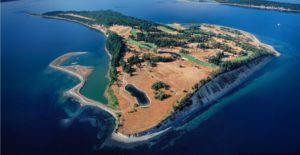
BC Provincial Approving Officer Rejects US-based Subdivision Application for ȽEL¸TOS (James Island)
Tsawout First Nation celebrates the rejection by the Province of an application for a subdivision on ȽEL¸TOS (James Island), an island off the east side of the Saanich Peninsula on Vancouver Island, BC. The Provincial Approving Officer (“PAO”) refused to approve the application for 79 strata lots, designated to be marketed as vacation rentals/summer homes that J.I. Properties Inc., the “Applicant” for the subdivision, said were unlikely to be lived in year-round. The PAO refused to approve the application on the bases that the application is against the public interest.
In his decision, the PAO accepted Tsawout’s position that the assessment of “public interest” must consider reconciliation and whether the duty to consult has been fulfilled:
- I consider reconciliation with Indigenous peoples and the Province’s duty to consult to be integral parts of the public interest. The Province is committed to reconciliation with Indigenous peoples as reflected in the Draft 10 Principles that Guide the Province of British Columbia’s Relationship with Indigenous Peoples and the ongoing implementation of the Declaration on the Rights of Indigenous Peoples Act SBC 2019 c. 44. As a decision cannot be in the public interest if the duty to consult has not been satisfied, consultation with Tsawout significantly informs the public interest analysis on this proposed subdivision.
“Through consultation with Tsawout, the province has begun to recognize our deep and undeniable connection to ȽEL¸TOS,” said Tsawout elder Mavis Underwood in a statement. “We are pleased that this development proposal will not proceed. ȽEL¸TOS is an integral part of our culture and community, and it is past time that it be returned to our stewardship.”
“I think this is the first time, that I’m aware of, that there’s a concrete application of the DRIPA [Declaration on the Rights of Indigenous People Act] acts in a provincial approval process,” says DGW Law’s John Gailus and legal counsel for Tsawout. “I think that’s significant.”
The PAO cites recent amendments to the provincial Interpretation Act that require provincial laws to be interpreted as (i) upholding s. 35 rights and (ii) consistent with the United Nations Declaration on the Rights of Indigenous Peoples (“UNDRIP”). The PAO lists the following UNDRIP articles as informing his decision:
- Article 11 (right to maintain and protect past, present and future culture);
- Article 12 (access to religious and cultural sites);
- Article 13 (right to revitalize, use and develop culture);
- Article 25 (right to maintain and strengthen spiritual relationship with traditionally occupied territories);
- Article 26 (right to use, develop and control traditional territories);
- Article 29 (protection and conservation of territories); and
- Article 32 (right to determine and develop priorities for the development of territories).
The PAO’s decision focused primarily on four areas of concerns: archaeology, culture, environment, and governance. With the information provided, the PAO accepts that given the high archaeological potential of the island, additional archaeological sites may exist besides those that have been recorded. There is also concern of whether the proposed mitigation and accommodation measures from the Applicant adequately address Tsawout’s concerns.
In addition to reconciliation, the duty to consult, and outstanding impacts on Tsawout’s Aboriginal Interests, other issues raised by Tsawout that informed the PAO’s assessment of the “public interest” include:
- the nature of the development (upscale vacation homes), which the PAO described as “more of a detriment” to conservation, stewardship and environmental protection;
- potential access issues given significant archaeological sites along the Island’s shoreline and the impacts that a larger marina would have on Tsawout’s marine harvesting activities;
- the development, at a minimum, risks environmental damage (saltwater intrusion, septic contamination, future tenure applications); and
- opposition from local governments (Islands Trust, Central Saanich) and elected representatives (Adam Olsen and Elizabeth May).
DGW Law is proud to continue working with Tsawout to hold B.C. accountable to its promises of reconciliation and commitment to the Declaration on the Rights of Indigenous Peoples Act, especially regarding ownership of ȽEL¸TOS.
Read more about the decision here.
Or watch the clip from CTV news here.
